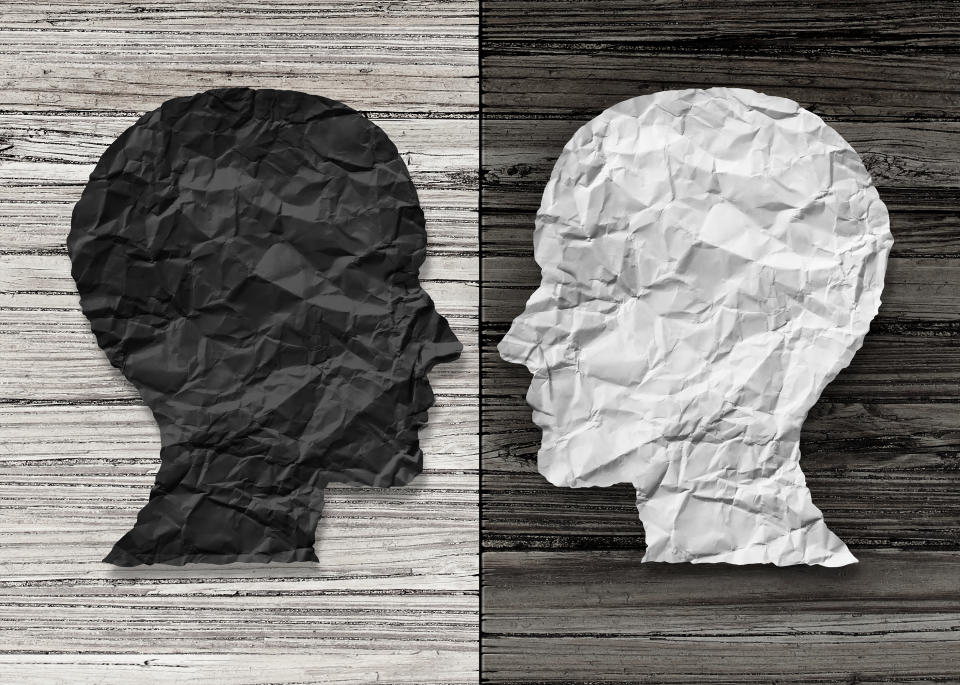What is Bipolar disorder?
When Kanye West was diagnosed with Bipolar disorder just over four years ago, he spoke openly about his condition, calling it a “superpower.”
But his recent erratic behaviour has highlighted the complexity of living with the mental health condition, and shown how important is to understand his actions in the context of the disorder.

What is Bipolar disorder?
Bipolar Affective Disorder is a mental health condition that is characterised by extreme moods – both high (manic) and low (depressed). Previously known as ‘manic depression’, it’s thought to affect around two per cent of the population.
What causes Bipolar disorder?
“As with most mental illnesses, Bipolar disorder is likely to be caused by a mixture of genetics, life experiences and other aspects of our biology,” doctor and mental health advocate Dr Keiran Kennedy tells Yahoo Lifestyle.
“However, of all mental health conditions, Bipolar Disorder has one of the strongest genetic links. This often, but not always, means the condition runs in families. Someone with a family member who suffers from Bipolar is at higher risk of having the condition themselves compared to the general population.”

How does Bipolar manifest in someone?
“For the most part, and when mood is stable, there won’t be any noticeable difference in someone with Bipolar disorder compared to anyone else,” says Dr Kennedy. “However, when mood shifts, someone with Bipolar will show a clear change in their mood and behaviour.
Lows
If someone is in a Bipolar “low”, they will show classic symptoms of depression. Clear signs include withdrawing, being notably sad or low, not sleeping or sleeping too much, and no longer enjoying everyday activities.
Highs
If someone is in a Bipolar “high”, this is known as mania. This might present as someone’s mood shifting up, with high energy, racing thoughts and fast speech.

What is a manic episode?
“A manic episode is hallmark of Bipolar disorder,” explains Dr Kennedy. “It includes a number of defined signs and symptoms that psychiatrists use to diagnose the condition. Common features include:
Ecstatic or euphoric mood, even if there is no clear reason
Thoughts that race
Lots of ideas, new goals and plans
Sleeping much less than usual, or not at all
Significant rise in energy levels
“In severe cases people can start to behave in ways that are significantly out of character, such as displaying risky behaviour, or having grandiose beliefs about themselves or others, such as feeling they have special abilities or missions for the world.”

What should I do if I think someone has Bipolar disorder?
“Never shy away from broaching concerns or talking to a loved one about their mental health,” says Dr Kennedy. “If you’ve noticed changes or signs of shifts in mood, ask how they’re feeling and if they have noticed they’re feeling or acting differently.”
“For significant concerns, professional input is recommended. Make an appointment with your GP, a psychologist or a psychiatrist who can help you work out what’s going on, get a diagnosis, and get access to the necessary supports.”
For acute concerns around your own or someone else’s mental health, either call 000 or an emergency support such as Beyond Blue on 1300 22 4636 or Lifeline on 13 11 44.
Can Bipolar disorder be treated?
Medication
“Bipolar Disorder is a very treatable condition - and it’s vital people know this,” says Dr Kennedy. “Medications can help stabilise someone’s mood. This reduces the risk of shifts that might put someone in place of experiencing major depression or mania. This is often the mainstay of treatment.”
Lifestyle
“Psychological support is a positive and a protective factor too,” says Dr Kennedy. “Good lifestyle practices such as protecting sleep, avoiding excessive alcohol or drugs, and learning to manage stress constructively, can all help someone keep their mood on more even ground.”

What medication treats Bipolar disorder?
“Mood stabilisers such as Lithium or Sodium Valproate are usually prescribed,” says Dr Kennedy. It’s essential to see a doctor regularly to ensure medication suits individuals.
How does Bipolar disorder impact people’s lives?
“The message to anyone with Bipolar, and their loved ones, is that they can live a very normal life,” says Dr Kennedy. “Although Bipolar is usually a life-long condition that needs monitoring and treatment, for the vast majority of people, the condition is stable when recommended treatments and inputs are taken.”
However, periods of relapse in mood can significantly impact someone’s life. “Periods of depression can be incredibly difficult, and mania can cause significant changes in someone’s usual patterns of thinking, feeling and behaving. When moving through a period like this, those with Bipolar might need more intensive treatment and support,” says Dr Kennedy.
“For loved ones, this can be a worrying and stressful time. Supporting someone with Bipolar disorder might be a challenge for family members at times, particularly if the individual isn’t keen on recommended treatments or support. It can benefit loved ones to seek their own support if necessary.”
How can I help a loved one with Bipolar disorder?
Watch out for early warning signs
“Family members and loved ones are often the first people to notice signs of change in someone, whether it’s a lowering of mood, or a rise in emotion and change in behaviour that might come with mania,” says Dr Kennedy.
“You can help someone with Bipolar recognise that things are starting to become unsettled and help them action help.”
Encourage healthy habits
“Family members and friends can make a huge difference to how someone manages their Bipolar disorder,” says Dr Kennedy.
“Encouraging someone with Bipolar disorder to follow up with appointments and to remember their recommended treatment is vital. You can also encourage everyday lifestyle actions that help stabilise and protect someone’s mood, such as protecting their sleep with a regular schedule, helping manage stress and encouraging them to reach out if they’re worried.”
Mental health support for yourself or a loved one can be found by calling Lifeline on 13 11 14, Mensline on 1300 789 978, or Kids Helpline on 1800 551 800. Online support is available via Beyond Blue.
Click here to sign up to our daily newsletter to get all the latest news and hacks. Or if you have a story tip, email us at lifestyle.tips@verizonmedia.com.

 Yahoo Lifestyle
Yahoo Lifestyle 



